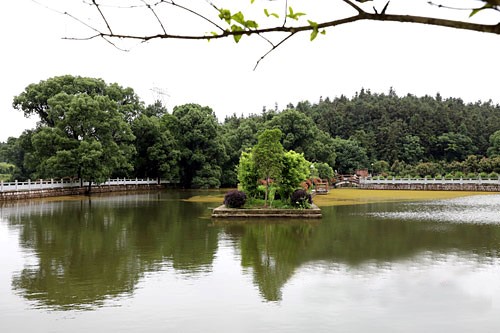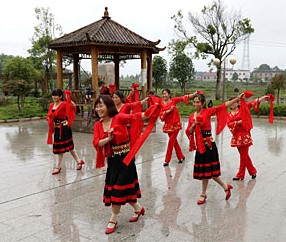Culture, prosperity bloom in formerly impoverished village in Fujian province
p.china.org.cn by Liu Yizhou,February 24, 2021 Adjust font size:

A view of a lotus pond in Lingtang village, Wangqiao township, Dongxiang district, Fuzhou city, Fujian province [Jiangxi News/Wang Qian]
Turf composed of lush Zoysia tenuifolia grass, sometimes known as “Taiwan green,” modern exercise equipment, well-designed wooden pavilions, and clean and spacious public squares...This scene does not describe a residential community in an urban area but rather a small village in Fujian province known as Lingtang.
The mountainous hamlet is located in the northeast part of Wangqiao township, Dongxiang district, Fuzhou city, and is home to 1,314 people in 301 households. In 2015, 30 of Lingtang’s residents in nine of its households were found to be living under the poverty line when China began preparing to engage in targeted poverty alleviation in its impoverished villages during its 13th Five-Year Plan period.
Lingtang soon launched an industry-oriented poverty reduction project and began updating its style and appearance with the help of government officials and the Nanchang Institute of Technology. The village emerged from poverty in December 2016 and has continued to develop and evolve.
Lotus industry helps address poverty
Women living in Wangqiao used to frown upon potential blind dates with people from Lingtang, and their parents would shake their heads if they heard about such a possibility. The town’s residents often noted that the village “did not even have decent roads, so cars couldn’t drive into it.”
Lingtang Party Secretary Chen Guiyuan has been working in the community for 28 years, and the destitution that it suffered from in the past has left a deep impression on him. Poverty alleviation policies began to benefit the hamlet after it was designated a provincial-level impoverished village, however, and funding was provided for the purpose of developing industries that help people escape from poverty. The secretary was unsure of what to pursue when the funds were first allocated, but Lingtang had access to a special working group known as Lianxin, or “mutual concern,” that the Nanchang Institute of Technology created for the purpose of assisting it.
“We weren’t very familiar with agriculture at first, but our college organized frequent cross-department meetings, which made it possible for us to share information and learn more about it,” explained an individual affiliated with the Nanchang Institute of Technology who serves as Lingtang’s first secretary named Gong Yonghong in mid-2020. “We also brought lists of the village’s residents’ questions back to our school and spoke with various experts in order to get them answered. It was suggested that Lingtang begin cultivating lotus plants because the conditions that exist in the village are suited to the endeavor and it could become one of its main industries.”
A land transfer system was soon implemented, which made it possible to quickly develop 3.46 ha’s worth oflotus ponds. Lingtang invested 300,000 yuan (US$46,276) in the construction of roads and a drainage system, and three villagers were chosen to spearhead its lotus industry. It stipulates that every contractor is supposed to work with four impoverished households and that each of these will receive a 2,000-yuan (US$309) annual dividend. The three contractors are also required to hire members of poverty-stricken households during peak season and pay them 100 to 150 yuan (US$15 to US$23) per person per day. The endeavor has been going well, which has led to Lingtang expanding its lotus ponds to their current 6.13 ha of surface area.
Excluding dividends, each contractor has to pay at least 20,000 yuan (US$3,085) in salary annually,” Chen Guiyang mentioned. “It has become an important source of income for the impoverished households.”
Poultry farming promotes prosperity
One can hear the sound of birds fighting in the distance when approaching Lingtang. It comes from another new industry that can be found in the village – the pheasant farming that some residents engage in not far from the hamlet’s lotus ponds.
“Pheasants are strong, active, and aggressive, which makes their meat delicious and nutritious,” noted the person in charge of Lingtang’s poultry farming operation, Chen Guanghua.
The agriculturalist had raised the birds in other areas in the past, so he suggested that the Wangqiao-administered community may want to give the undertaking a try as well when officials were thinking about what industries to pursue in 2016. Chen Guiyuan decided that Lingtang should firstinvest 170,000 yuan (US$26,223) of poverty alleviation funding in the construction of roads and electrical infrastructureafter many rounds of discussions withGong Yonghong.TheNanchang Institute of Technology also underwrote 90,000 yuan’s (US$13,883) worth of coops and feed. Chen Guanghua issues a total of 18,000 yuan (US$2,777) of dividends to nine impoverished households that work on the project every year as part of a contract that he signed, and the Nanchang Institute of Technology union agreed to purchase more than 1,000 pheasants per year, which helps guarantee steady sales.
“The birds need to be taken care of for at least six months in order to ensure quality,” Chen Guanghua explained. “They can then be sold for 100 yuan (US$15) each. The Nanchang Institute of Technology bought a total of 2,800 pheasants in 2018 and 2019 alone, and other organizations also purchase birds from us. The business brings in about 70,000 to 80,000 yuan (US$10,798 to US$12,340) of net profit per year.”
Culture blooms in Lingtang

Lingtang’s dance group rehearses a Chinese square dance.[Jiangxi News]
Chen Guiyuan became even more determined to improve the style and appearance of the village as its industries developed.
“Lingtang used to be filled with dust on sunny days and mud on rainy days,” Lingtang’s Party secretary recalled. “We needed to enhance the living environment in the village in addition to its level of prosperity in order to fully eliminate the impoverished conditions that existed.”
He also mentioned that a number of dilapidated homes, pig and cattle pens, and latrines were demolished and that unified planning has informed the development that has occurred.
“All the earth roads have been changed into concrete roads, and a reservoir reinforcement project has been completed,” Chen Guiyuan continued. “These endeavors formed a good foundation on which to update the village’s facilities.”
In 2017, Lingtang began focusing on enhancing its landscape architecture, and the Nanchang Institute of Technology sent individuals associated with the school to the village to engage in many rounds of planning and design work. New lights were eventually installed throughout the community, and three public squares were built.
“The people who helped improve Lingtang’s appearance dug deep into its culture and history and portrayed it in the signs, stonework, and other features that were installed, which has enhanced residents’ sense of pride and belonging,” Chen noted.
Lingtang also submitted an application for a professional dance instructor to teach its residents Chinese square dancing to the Fuzhou Municipal Bureau of Culture, Radio, Film and Television, and Press and Publication in order to further enhance the level of culture in the hamlet, and it was promptly approved. Many residents began participating and gradually became more familiar with the activity before they developed a habit of dancing regularly. The people who got involved formed a dance group, and it has been becoming more and more cohesive.
“I didn’t expect our request to be accepted so quickly,” Lingtang’s Party secretary stated. “A teacher from Beijing Dance Academy arrived in the village soon after it was submitted, however. More than 40 of Lingtang’s residents are currently members of its dance group and are fully equipped with uniforms, dance shoes and music equipment. As long as the weather is good, everyone will go to one of our village squares to participate.”
Chen Meiju is the leader of Lingtang’s dance group. She is very happy about the improvements that have been made to the living environment in the village.
“Lingtang is like an urban community,” the lead dancer pointed out. “Beautiful public squares and grass fields can be found throughout the village. People like to go for a walk after dinner. Our days are very happy.”
Lingtang has gained recognition for the efforts that have been made and was even designated a “National Civilized Village” at the end of 2017 as a result of its ambition and admirable commitment to virtue.
“Living conditions have improved in Lingtang, and its style and appearance have changed,” Chen Guiyuan said. “The other village officials and I have been committed to setting examples and providing good services.”
The Party secretary also explained that the hamlet has been holding meetings for the purpose of disseminating information about issues both major and minor and discussing them in recent years and that democratic appraisal has become a common practice in the village.
“None of Lingtang’s residents objected to the poverty alleviation plans that were made, especially with regard to the use of funding, which has affirmed the work that has been done and has encouraged officials to adhere to them,” Chen Guiyuan concluded.